鬼の居ぬ間に洗濯とは?
「鬼の居ぬ間に洗濯」(おにのいぬまにせんたく)は、日本のことわざで、「恐ろしい存在や厳しい監視がないときに、のびのびと自由に振る舞うこと」を意味します。この「鬼」は、恐ろしい上司や厳格な親など、日常でストレスやプレッシャーを与える存在を象徴しています。「洗濯」という言葉は、ここでは実際の洗濯作業ではなく、心身のリフレッシュや気晴らしを指します。
ことわざの意味
直訳的な意味
「鬼」(厳しい存在)がいないときに、安心して自由に好きなことをすることを指します。
比喩的な意味
普段は抑圧されている環境や状況の中で、一時的に自由を得た瞬間を楽しむこと。
現代的な解釈
上司が会議や出張でいない間に職場でリラックスする、親が留守中に子どもが好きなことをする、といった状況に使われます。
ことわざの背景と由来
鬼という存在
「鬼」は日本の伝承で恐怖や力強さを象徴する存在です。このことわざでは、鬼が「圧力を与える存在」や「怖い相手」として比喩的に用いられています。
洗濯の意味
昔の日本では、家事や洗濯などの雑務は主に女性の仕事とされていましたが、家長や厳しい目を持つ人がいるときには落ち着いて作業ができなかったため、自由な時間に洗濯などを済ませたという風景が由来とされています。
具体的な使用例
職場での例
状況:厳しい上司が出張で不在。
例文:「鬼の居ぬ間に洗濯だね。今日はリラックスして仕事しよう。」
家庭での例
状況:親が外出し、子どもがゲームを楽しむ。
例文:「親がいない間に好きなゲームをして、まさに鬼の居ぬ間に洗濯だ!」
学校での例
状況:担任の先生が急用でいない。
例文: 「今日は担任の先生がいないから、みんな鬼の居ぬ間に洗濯みたいだね。」
心理的な背景
圧力からの解放
人は、厳しい監視下にいるとストレスを感じます。そのため、監視がない状況では自然とリラックスし、自由に行動する心理が働きます。
一時的な自由の喜び
厳しい状況が日常であるほど、その束縛から解放された瞬間は特別な喜びを感じます。
道徳観との関わり
このことわざには、自由を得た瞬間に「羽を伸ばすことの楽しさ」と同時に、「その状況が一時的である」という認識も含まれています。
似たことわざや表現
日本の類似表現
「羽を伸ばす」:厳しい状況から解放されて、自由に行動することを指します。
英語の類似表現
「When the cat’s away, the mice will play.」(猫がいない間にネズミが遊ぶ)
厳しい監視者がいないときに、人が自由に振る舞うという意味。
現代社会における適用例
職場環境での適用
上司や同僚がいない環境では、リラックスしながら仕事ができる一方で、生産性が下がる場合もあります。
教育現場での適用
教室で教師がいないと、生徒が騒いでしまうことがあります。
デジタル社会
現実社会では言えないことを匿名で発信する行動も、ある意味で「鬼の居ぬ間に洗濯」といえます。
このことわざの教訓と注意点
ポジティブな教訓
時には束縛から解放されて、リラックスする時間を持つことが重要だというメッセージを含みます。
ネガティブな側面
自由を得たときに羽目を外しすぎると、後で問題になる可能性があることも示唆しています。
「鬼の居ぬ間に洗濯」は、日常生活の中で厳しい状況から解放された瞬間の自由やリフレッシュの喜びを表現することわざです。しかし、その自由は一時的であることが多く、行動には注意が必要です。このことわざは、適度なリラックスの重要性と、自由の中にも責任を持つ必要性を同時に教えています。
Oni no inuma ni washa” (washing clothes while the devil is away) is a Japanese proverb meaning ”to act freely and spontaneously when there is no frightening presence or strict supervision. This “oni” symbolizes the presence of a dreaded boss, a strict parent, or any other entity that causes stress and pressure in our daily lives. The word “laundry” refers here not to the actual washing process, but to the refreshing and distraction of mind and body.
Proverbial Meaning
Literal meaning.
Refers to the freedom to do what one likes in the absence of “demons” (demanding entities), in peace of mind.Figurative meaning
To enjoy a moment of temporary freedom in an environment or situation that is normally oppressive.Contemporary interpretation
Used in situations such as relaxing at work while the boss is away on a meeting or business trip, or children doing what they like to do while their parents are away.Background and Origin of the Proverb
The Oni, or Demon
Oni” is a symbol of fear and strength in Japanese folklore. In this proverb, oni is used figuratively as a “pressuring presence” or “scary opponent.The Meaning of Laundry
In old Japan, chores such as housework and laundry were considered to be mainly women’s work, but since they could not work calmly when the patriarch or someone with a strict eye was present, the proverb originates from a scene in which people finished laundry and other chores in their free time.Specific examples of use
Example in the workplace
Situation: Strict boss is away on a business trip.
Example: “You’re doing laundry while the devil is away. Let’s relax and work today.”Example at home
Situation: Parents are out of the house and the children are enjoying a game.
Example sentence: “Playing your favorite game while your parents are away is just like doing laundry while the devil is away!Example at school
Situation: The homeroom teacher is away on urgent business.
Example sentence: “Since the homeroom teacher is out today, it looks like everyone is doing laundry while the devil is away.Psychological background
Relief from pressure
People feel stress when they are under strict surveillance. Therefore, in a situation where there is no supervision, people naturally relax and act freely.The pleasure of temporary freedom
The more severe the situation is on a daily basis, the more special joy is felt at the moment of release from its bondage.Relation to moral values
The proverb includes the joy of “stretching one’s wings” at the moment of freedom, as well as the recognition that the situation is temporary.Similar proverbs and expressions
Similar expressions in Japan
Stretch your wings”: refers to the freedom to act freely after being released from a difficult situation.Similar expressions in English
When the cat’s away, the mice will play.
means that a person behaves freely when there is no strict observer.Examples of application in modern society
Application in the work environment
In an environment where there are no bosses or co-workers, people can work in a relaxed manner, but at the same time, their productivity may decrease.Application in educational settings
When a teacher is not present in the classroom, students may become noisy.Digital Society
In a sense, the behavior of anonymously sending out messages about things that cannot be said in the real world can also be described as “washing clothes while the devil is away.Lessons Learned and Cautions for this Proverb
Positive Lesson.
Contains the message that sometimes it is important to have time to relax and be free from constraints.Negative Aspects
It also suggests that ruffling too many feathers when you have freedom may cause problems later.The proverb “washing clothes while the devil is away” expresses the joy of freedom and refreshment at the moment one is released from a demanding situation in one’s daily life. However, that freedom is often temporary and requires caution in one’s actions. This proverb simultaneously teaches the importance of moderate relaxation and the need to be responsible in one’s freedom.
AIが描いた「鬼の居ぬ間に洗濯」
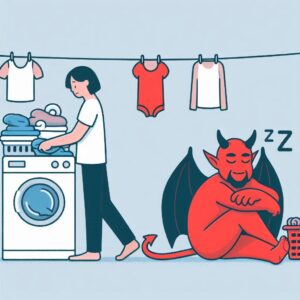
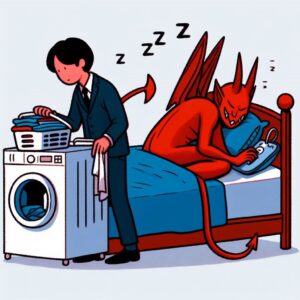
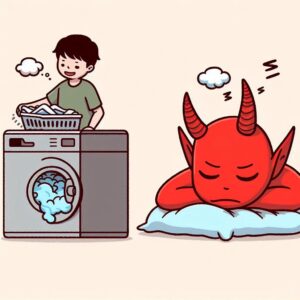
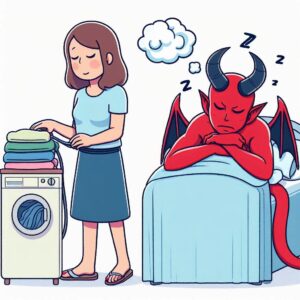
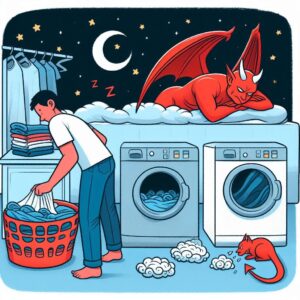
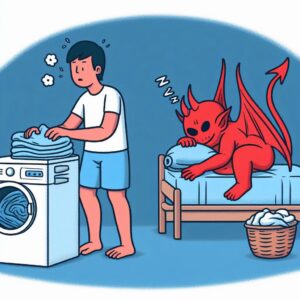
















コメント